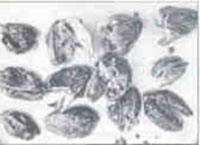Seeds of purity
 ALTHOUGH the majority of rural folk have always been lacking access to clean hygienic water for a considerable time, traditional water purification techniques have generally been overlooked. Some of these traditionally proven methods use locally available plant seeds much in contrast to the modern treatment of water. Functionally significant, these simple techniques have been utilised in many parts of the world to obtain safe drinking water. This was brought to light by a study entitled Appropriate Rural Technologies by Dincsh Bharadwaj of Consortium on Rural Technology.
ALTHOUGH the majority of rural folk have always been lacking access to clean hygienic water for a considerable time, traditional water purification techniques have generally been overlooked. Some of these traditionally proven methods use locally available plant seeds much in contrast to the modern treatment of water. Functionally significant, these simple techniques have been utilised in many parts of the world to obtain safe drinking water. This was brought to light by a study entitled Appropriate Rural Technologies by Dincsh Bharadwaj of Consortium on Rural Technology.
One technique advocated by the ancient Indian sage Sushruta includes purifying water with a natural coagulant like kataka seeds (Stryclumos potatorum). The Wract is prepared from a thick paste of crushed seeds which is put in water the same day. After stirring the water for a few minutes, it is treated with alum. Sparkling clean water is obtained by this method.
Similarly, the seeds of Bhela (Semacarnus anacardium) are rubbed onto a stone and made into a thick paste. This mucilagenous (viscous) material is then immersed in turbid water for obtaining crystal clean water. This technique is prevalent all over central India.
Moreover, in southern India, crushed seed coats from elaiclu (cardamom) are dusted on the water surface. Stirring follows. Water which is got is cleaner than before, and does not possess any of its earlier foul smell and taste either. Seeds of drumstick (Morenga olifera) are used as a coagulant to purify muddy water. Essentially a Sudanese discovery, the technique involves removal of the wings and coat of the seed. The white kernel is crushed in a mortar and the powder is mixed with a small J amount of already purified water. The mixture is stirred for a few minutes and the suspension thus obtained is poured through a tea strai ner into the turbid water. Water gets purified after being stirred slowly by a wooden twirling stick for 10 minutes.
If popularised among villagers, these simple techniques could provide workable solution to drinking water problem in areas lacking safe water supply. Thus, established as proven meth- ods, the traditional water purification techniques can certainly go a long way in ensuring potable water to millions of villagers the world over.
